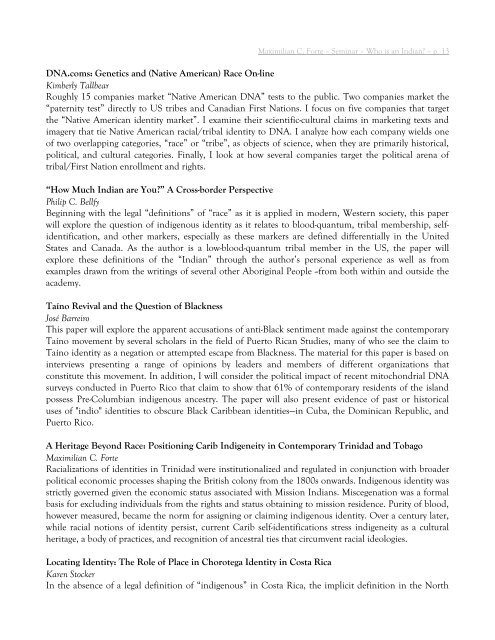Who Is An Indian: Race, Blood, DNA, and the Politics of Indigeneity in the Americas
by Dr. Maximilian C. Forte
by Dr. Maximilian C. Forte
You also want an ePaper? Increase the reach of your titles
YUMPU automatically turns print PDFs into web optimized ePapers that Google loves.
Maximilian C. Forte – Sem<strong>in</strong>ar – <strong>Who</strong> is an <strong>Indian</strong>? – p. 13<br />
<strong>DNA</strong>.coms: Genetics <strong>and</strong> (Native American) <strong>Race</strong> On-l<strong>in</strong>e<br />
Kimberly Tallbear<br />
Roughly 15 companies market “Native American <strong>DNA</strong>” tests to <strong>the</strong> public. Two companies market <strong>the</strong><br />
“paternity test” directly to US tribes <strong>and</strong> Canadian First Nations. I focus on five companies that target<br />
<strong>the</strong> “Native American identity market”. I exam<strong>in</strong>e <strong>the</strong>ir scientific-cultural claims <strong>in</strong> market<strong>in</strong>g texts <strong>and</strong><br />
imagery that tie Native American racial/tribal identity to <strong>DNA</strong>. I analyze how each company wields one<br />
<strong>of</strong> two overlapp<strong>in</strong>g categories, “race” or “tribe”, as objects <strong>of</strong> science, when <strong>the</strong>y are primarily historical,<br />
political, <strong>and</strong> cultural categories. F<strong>in</strong>ally, I look at how several companies target <strong>the</strong> political arena <strong>of</strong><br />
tribal/First Nation enrollment <strong>and</strong> rights.<br />
“How Much <strong>Indian</strong> are You?” A Cross-border Perspective<br />
Philip C. Bellfy<br />
Beg<strong>in</strong>n<strong>in</strong>g with <strong>the</strong> legal “def<strong>in</strong>itions” <strong>of</strong> “race” as it is applied <strong>in</strong> modern, Western society, this paper<br />
will explore <strong>the</strong> question <strong>of</strong> <strong>in</strong>digenous identity as it relates to blood-quantum, tribal membership, selfidentification,<br />
<strong>and</strong> o<strong>the</strong>r markers, especially as <strong>the</strong>se markers are def<strong>in</strong>ed differentially <strong>in</strong> <strong>the</strong> United<br />
States <strong>and</strong> Canada. As <strong>the</strong> author is a low-blood-quantum tribal member <strong>in</strong> <strong>the</strong> US, <strong>the</strong> paper will<br />
explore <strong>the</strong>se def<strong>in</strong>itions <strong>of</strong> <strong>the</strong> “<strong>Indian</strong>” through <strong>the</strong> author’s personal experience as well as from<br />
examples drawn from <strong>the</strong> writ<strong>in</strong>gs <strong>of</strong> several o<strong>the</strong>r Aborig<strong>in</strong>al People --from both with<strong>in</strong> <strong>and</strong> outside <strong>the</strong><br />
academy.<br />
Taíno Revival <strong>and</strong> <strong>the</strong> Question <strong>of</strong> Blackness<br />
José Barreiro<br />
This paper will explore <strong>the</strong> apparent accusations <strong>of</strong> anti-Black sentiment made aga<strong>in</strong>st <strong>the</strong> contemporary<br />
Taíno movement by several scholars <strong>in</strong> <strong>the</strong> field <strong>of</strong> Puerto Rican Studies, many <strong>of</strong> who see <strong>the</strong> claim to<br />
Taíno identity as a negation or attempted escape from Blackness. The material for this paper is based on<br />
<strong>in</strong>terviews present<strong>in</strong>g a range <strong>of</strong> op<strong>in</strong>ions by leaders <strong>and</strong> members <strong>of</strong> different organizations that<br />
constitute this movement. In addition, I will consider <strong>the</strong> political impact <strong>of</strong> recent mitochondrial <strong>DNA</strong><br />
surveys conducted <strong>in</strong> Puerto Rico that claim to show that 61% <strong>of</strong> contemporary residents <strong>of</strong> <strong>the</strong> isl<strong>and</strong><br />
possess Pre-Columbian <strong>in</strong>digenous ancestry. The paper will also present evidence <strong>of</strong> past or historical<br />
uses <strong>of</strong> "<strong>in</strong>dio" identities to obscure Black Caribbean identities—<strong>in</strong> Cuba, <strong>the</strong> Dom<strong>in</strong>ican Republic, <strong>and</strong><br />
Puerto Rico.<br />
A Heritage Beyond <strong>Race</strong>: Position<strong>in</strong>g Carib <strong>Indigeneity</strong> <strong>in</strong> Contemporary Tr<strong>in</strong>idad <strong>and</strong> Tobago<br />
Maximilian C. Forte<br />
Racializations <strong>of</strong> identities <strong>in</strong> Tr<strong>in</strong>idad were <strong>in</strong>stitutionalized <strong>and</strong> regulated <strong>in</strong> conjunction with broader<br />
political economic processes shap<strong>in</strong>g <strong>the</strong> British colony from <strong>the</strong> 1800s onwards. Indigenous identity was<br />
strictly governed given <strong>the</strong> economic status associated with Mission <strong>Indian</strong>s. Miscegenation was a formal<br />
basis for exclud<strong>in</strong>g <strong>in</strong>dividuals from <strong>the</strong> rights <strong>and</strong> status obta<strong>in</strong><strong>in</strong>g to mission residence. Purity <strong>of</strong> blood,<br />
however measured, became <strong>the</strong> norm for assign<strong>in</strong>g or claim<strong>in</strong>g <strong>in</strong>digenous identity. Over a century later,<br />
while racial notions <strong>of</strong> identity persist, current Carib self-identifications stress <strong>in</strong>digeneity as a cultural<br />
heritage, a body <strong>of</strong> practices, <strong>and</strong> recognition <strong>of</strong> ancestral ties that circumvent racial ideologies.<br />
Locat<strong>in</strong>g Identity: The Role <strong>of</strong> Place <strong>in</strong> Chorotega Identity <strong>in</strong> Costa Rica<br />
Karen Stocker<br />
In <strong>the</strong> absence <strong>of</strong> a legal def<strong>in</strong>ition <strong>of</strong> “<strong>in</strong>digenous” <strong>in</strong> Costa Rica, <strong>the</strong> implicit def<strong>in</strong>ition <strong>in</strong> <strong>the</strong> North


















